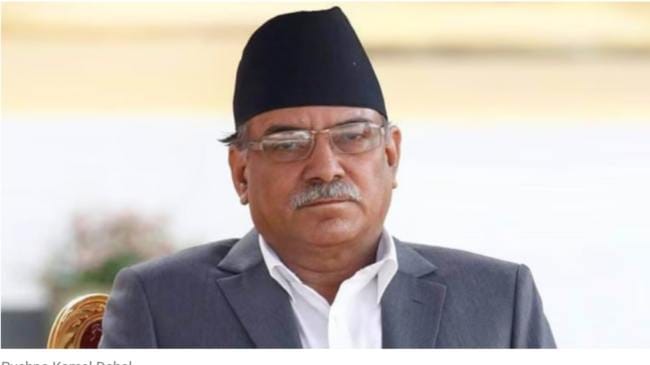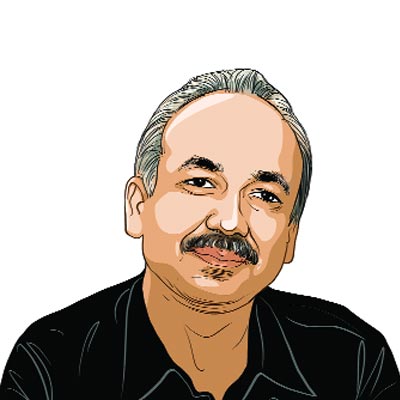Opinion Prachanda’s coalition shift: Declining confidence in government, calls for a Hindu rashtra
With the economy in shambles, the judiciary filled with political party activists, widespread corruption and leaders immune from any criminal charges, the public anger is fast drumming up support for a possible return of the Hindu kingdom with the dethroned King Gyanendra Shah leading the campaign
 Prachanda made it clear that he was anticipating further pressure at home, and from India under PM Narendra Modi to toe the Hindutva line in Nepal.
Prachanda made it clear that he was anticipating further pressure at home, and from India under PM Narendra Modi to toe the Hindutva line in Nepal. Each time Maoist leader Pushpa Kamal Dahal (Prachanda) decides to leave an existing coalition to join another, he ensures that the next one is more progressive than the last in a bid to retain power. His modus operandi this time was no different. On March 4, he abandoned the Nepali Congress, the largest party in parliament and his coalition partner for the last 15 months. He joined forces with the Communist Party of Nepal-Unified Marxist Leninist led by K P Oli to send the message that he is aligning with progressive and anti-reactionary forces.
The new coalition government, comprising seven parties, secured the mandatory vote of confidence in parliament on March 13, securing 157 votes in a house of 275. The support extended by the Rastriya Swatantra Party (RSP) with 21 members tilted the balance in its favour giving Dahal’s side two seats more than the required 138. RSP Chief Rabi Lamichhane is currently one of four deputy PMs and Minister of Home Affairs of Nepal. But the Opposition is demanding his resignation for his alleged involvement in the embezzlement of funds by the Pokhara-based company Surya. Lamichhane, a maverick, has made the anti-corruption drive his one-point agenda which has already resulted in the arrest of high-profile allies including K B Mahara — vice president of the Communist Party of Nepal (Maoist Centre) and a former speaker of the House of Representatives — in a gold smuggling case. Prachanda welcomed the arrest even though he was protecting his party colleague.
Nepali Congress (NC) Chief Sher Bahadur Deuba felt betrayed when Prachanda chose a new coalition partner after Deuba, as per a mutual agreement, made a list of new members for the cabinet to revamp the Maoist-NC coalition. Ultimately, Prachanda banded together with Oli’s CPN-UML, Rastriya Swatantra Party, Jana-Unmukti Party and the Janata Samajbadi party.
But considering the public contempt displayed by these parties towards each other and their conflicting principles, there are suspicions about the longevity of this government. Prachanda’s earlier statement that he would rather be a beggar on the street than work with Oli has gone viral with comments ridiculing him. Oli has made derogatory remarks against Prachanda and Madhav Nepal.
Over the last 17 years, the prime ministerial post has only been held by three parties — Nepali Congress, UML and Maoists, except for 11 months in 2013 when the sitting Chief Justice Khil Raj Regmi held the post — and have acquired ‘immunity’ from any scrutiny by anti-graft bodies, or parliament. None of the prime ministers has been investigated in any scam despite evidence against all of them. The authority of the state has eroded drastically due to the failure of parliament to make the executive accountable.
After the world’s only Hindu kingdom (Nepal) was declared a secular republic in 2006, leaders of all the major parties and the Maoists who led the armed struggle against the state agreed to shun violence and corruption and work for peace, political stability, consolidation of democracy and economic prosperity.
But with the economy now in shambles, the judiciary filled with political party activists, widespread corruption and leaders immune from any criminal charges, the public anger is fast drumming up support for a possible return of the Hindu kingdom with the dethroned King Gyanendra Shah leading the campaign.
People in Nepal may have a cynical view about leaders, but what happens here is also under scrutiny internationally. India’s visibly diluted approach in Nepal recently has flowed from its efforts to join the US to contain China, which has enhanced its presence and investment multifold in its south.
China welcomed the new political development in Nepal hoping all parties would come together for political stability and economic progress This was meant to confirm that its effort for a left coalition, much against the US-India wish, has worked.
The Prachanda-led new government is already extracting more concessions from China to bring the Belt and Road Initiative at the centre of its bilateral relationship. It has approached China to convert the $216 million Pokhara International Airport loan into a “grant” under the BRO, operate regular flights between the two countries, and provide another $786 million for the Nepal-China Friendly Industrial Park in eastern Nepal’s Jhapa area, adjoining west Bengal.
Prachanda is both cajoling the north and expressing his bitterness towards India in almost equal measure. “The reactionary forces were trying to use me, but I did not yield’, the two-pronged attack had not only India but the Nepali Congress also as targets.
Around 1,300 Nepali Congress party delegates have pressed for turning Nepal into a Hindu state now, less than 10 months after Prachanda was taken to the Hindu shrine Mahakaleshwar in Ujjain during his official visit to India in June. The Rastriya Prajatantra Party and others have set different deadlines beginning March-end to launch a mass movement for the restoration of Nepal’s status as a Hindu kingdom, with the former King Gyanendra also touring the country for support.
Prachanda made it clear that he was anticipating further pressure at home, and from India under PM Narendra Modi to toe the Hindutva line in Nepal. To block it effectively, he would have to side with the liberal coalition, which has not gained much confidence from the public.
Foreign Affairs Minister Narayan Kaji Shrestha, plans to visit China as the first destination abroad where, as the government’s common minimum programme says, it will seek the return of Nepali territories including Kalapani and Lipulek from India and seek a review of the 1950 India-Nepal Treaty of Peace and Friendship.
The writer is a journalist based in Kathmandu





